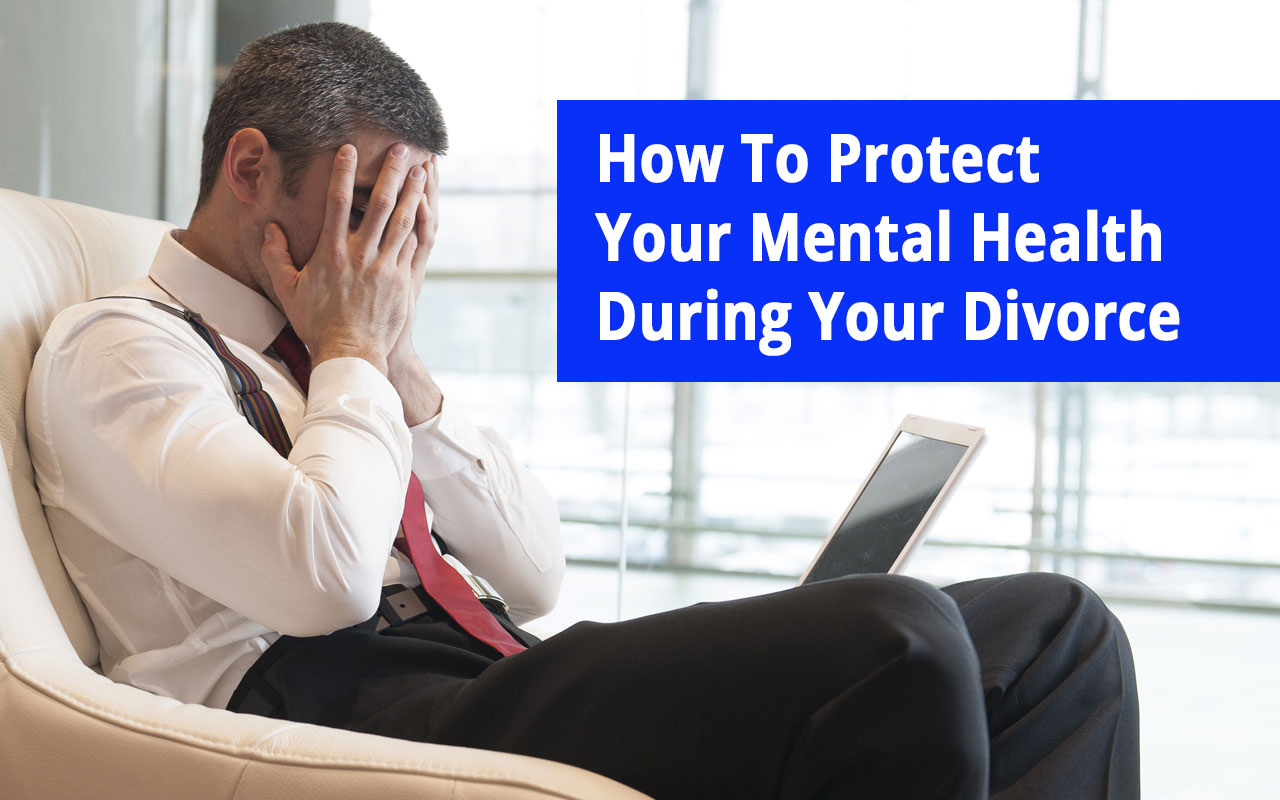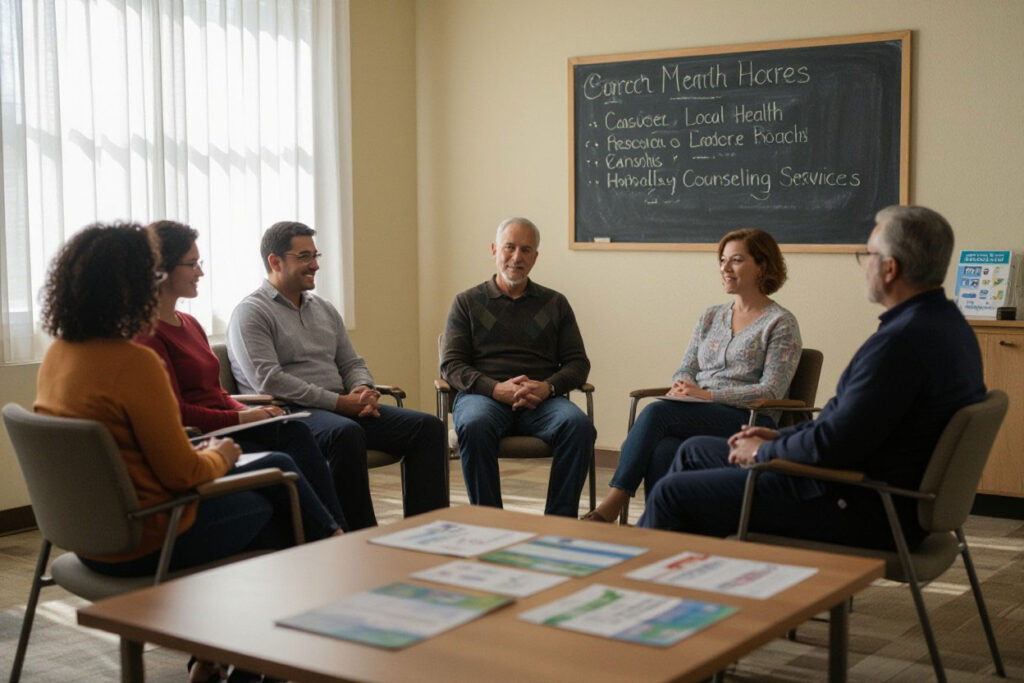Home »
Emotional & Mental Health Support During and After Divorce on Long Island, NY

When people think about divorce on Long Island, NY the first things that come to mind are often lawyers, paperwork, and court dates. But the truth is that divorce is never just a legal process. Divorce is also one of the most significant emotional and psychological transitions a person can face in their lifetime. Whether you’re contemplating legal separation, just beginning the divorce process, or already navigating its aftermath, the experience touches every part of your life: your identity, your relationships, your finances, and your sense of stability.
This article will provide you with the resources to identify emotional and mental health symptoms of emotional and mental health issues related to you divorce and provide you with concrete methods to combat these and the resources to get help when you need it.
Key Takeaways from This Article
- Divorce affects more than just your legal status; it’s an emotional and psychological journey that requires as much care as the legal process itself.
- Allow yourself the space to grieve and seek guidance from a Long Island therapist who understands divorce-related stress, trauma, and family transitions.
- Lean on community and peer support through local divorce groups, online forums, and faith-based or nonprofit programs in Nassau and Suffolk counties.
- Prioritize daily self-care. Consistent sleep, exercise, nutrition, and mindfulness routines can stabilize your mood and improve your decision-making.
- Support your children’s mental health with counseling, co-parenting workshops, and predictable routines that foster security and resilience.
- Use professional and crisis resources when needed. Long Island hotlines, national services (988), and community mental-health centers are available.
- Build a reliable network of friends, family, faith leaders, and professionals who can provide both emotional reassurance and practical assistance.
On Long Island, NY, where families are deeply connected to their communities and routines, divorce can feel like an earthquake that shakes more than just your household. Most people experience some kind of grief, anxiety, or even physical symptoms of stress. Parents worry about how their children will cope with the divorce. Others struggle with loneliness, anger, or a loss of confidence. These challenges are normal, but they can become overwhelming without the right tools and support systems in place.
That’s why it’s so important to view divorce not only through a legal lens but also through the lens of emotional and mental health. Proactively addressing the psychological side of divorce can help you make clearer decisions, protect your children, and begin rebuilding a sense of stability for the future. In this article, we’ll explore practical ways to support your mental well-being by connecting you with therapists, support groups, community resources, and daily coping strategies available across Nassau and Suffolk Counties on Long Island, NY so that you can move forward in your post-divorce life with resilience and clarity.
Divorce Will Change Your Life, But Doesn’t Define Your Future
Divorce may change the shape of your daily life, but it doesn’t have to define your future. By recognizing that emotional health and legal strategy go hand in hand, you can approach this transition with greater clarity and resilience.
In the sections that follow, we’ll look more closely at how divorce impacts your mental health, the ways grief and anxiety can surface, and the specific resources available on Long Island, NY to help you cope. From counseling options and community support groups to daily coping practices and child-focused strategies, you’ll find concrete steps to manage the emotional toll of separation while building a foundation for long-term recovery and growth.
The Psychological Transformation After Divorce on Long Island, NY
Understand how separation reshapes your identity and daily life
Post-divorce, I often see my Long Island clients experience divorce stress from the emotional impact of divorce. These clients experience anxiety, sleep disruption, and decision-fatigue surface alongside identity shifts. Roughly 40-50% of U.S. marriages end in divorce, and many clients report depression symptoms that last for months after the divorce is final. The psychological effects of divorce can manifest in many ways, including hypervigilance around finances or parenting, cognitive fog during legal decisions, and fluctuating motivation-patterns.
The Role of Grief in Divorce: More Than the Loss of a Partner
Recognizing and processing losses tied to routines, community, and self
Grief after divorce often includes loss of shared plans, social networks, and a previous sense of self, not just your partner. You might grieve rituals, mutual friends, or housing stability. To help them cope with the loss of divorce, I guide clients to name specific losses, differentiate ambiguous losses from concrete ones, and connect them with Long Island grief groups and therapists who offer targeted processing and practical resources.
Spotting the Signals: Depression and Anxiety During Divorce on Long Island, NY
When stress turns into clinical concern and how to respond early
I watch clients on Long Island move from the initial shock of the dissolution of their marriage to persistent divorce depression signs, including low energy, appetite shifts, insomnia, and spiraling worry, that can signal real concern for their mental health. Research indicates divorced adults can be up to twice as likely to develop major depression or anxiety disorders after divorce, especially in the first year after separation. If your daily functioning, work, or parenting slips, I advise connecting with a clinician, support group, or your primary care physician for screening and early mental health help on Long Island, NY.
Identifying the Red Flags: Signs of Divorce-Related Depression
Noticeable changes you should look out for include persistent sadness for two weeks or more, loss of interest in activities you used to enjoy, withdrawal from friends, difficulty concentrating, and neglecting basic self-care. Suicidal thoughts or increased substance use require immediate attention. I recommend tracking mood daily and bringing specific examples, like missed workdays, appetite shifts and sleep pattern changes, to a therapist or your doctor. There are many clinics and crisis lines on Long Island that can provide rapid evaluation of your symptoms.

Anxiety in Transition: Facing Financial and Custody Uncertainty in Divorce on Long Island, NY
Managing panic, overwhelm, and physical symptoms during legal change
Uncertainty about finances, custody, and housing commonly trigger hypervigilance about these matters, including racing thoughts, and panic symptoms that disrupt sleep and decision-making. I’ve seen that anxiety often peaks around court dates or financial deadlines. Grounding techniques, brief Cognitive Behavioral Therapy (CBT), and structured checklists for decisions can help reduce divorce anxiety that can overwhelm you while navigating legal timelines and stress-inducing appointments.
Physically, many of my clients experience tension headaches, gastrointestinal upset, and muscle tightness. Panic attacks can mimic cardiac events, so I advise clients to get an immediate medical evaluation if they experience chest pains. Practical steps to reduce divorce anxiety can include scheduling short, timed decision sessions, using financial worksheets, and attending a skills-based support group.
Finding Professional Help on Long Island, NY
Counseling, therapy, and community programs available in Nassau and Suffolk counties
I often steer clients in need of divorce counseling on Long Island toward therapy resources in Nassau and Suffolk, including Family Service League, Northwell Health’s behavioral health programs, the Nassau County Department of Mental Health, and the Suffolk County Division of Community Mental Hygiene Services. Private clinicians on the Long Island commonly offer CBT, and Internal Family Systems (IFS) therapy, while dozens of weekly support groups and 12-week divorce mental health services run across community centers. You’ll find evening and teletherapy options plus many sliding-scale fees, which helps you maintain consistent care through legal timelines and custody exchanges.
Individual vs. Group Therapy in Nassau and Suffolk: Choosing What Works for You
Tailoring support to your needs, budget, and emotional goals
When clients need focused trauma work, individual therapy for divorce issues including EMDR or targeted CBT over 6-12 sessions often speeds symptom relief. Group divorce therapy on Long Island is typically 6-10 people in 90-minute weekly sessions for 8-12 weeks, provides peer feedback, practice with co-parenting skills, and lower cost per session. Complex attachment or trauma histories are likely best served by individual counseling, while group therapy can help if you need validation, social learning, and accountability during separation.
Specialized Support for Diverse Needs on Long Island, NY
Bilingual providers, trauma-informed care, faith-based groups, and more
There are a number of Long Island providers that provide niche support systems, including bilingual therapists (Spanish, Haitian Creole), faith-based DivorceCare groups, trauma-informed clinicians for domestic violence survivors, and court-recognized parenting education. You can access legal and therapy collaboration for child custody evaluations, clinics offering perinatal mental health, and veteran-focused counselors, each tailored to the caregiving, cultural, and litigation realities many clients face on Long Island, NY.
I frequently refer clients to specific programs: local churches and community centers host DivorceCare and 8-week co-parenting classes; Family Service League runs short-term counseling plus parenting workshops; private practitioners offer many trauma informed divorce therapy programs; and Northwell-affiliated clinics provide coordinated care with psychiatric consultation. Teletherapy expansion since 2020 means you can join specialized groups across Long Island without long commutes, improving continuity through court dates and moving transitions.
The Power of Community: Divorce Support Groups on Long Island, NY
Tailored Groups: Divorced Men, Women, and Parents Finding Solace
If you feel more comfortable in a more exclusive setting you can try tailored divorce support groups on Long Island that address gendered dynamics and parenting realities. There are men’s peer support groups for divorce that focus on anger management, dating and financial rebuilding, while women’s divorce support groups tackle safety, self-esteem and career reinvention. Divorce recovery classes and parenting groups often run 6-8 weeks with modules on co-parenting, school communication, and managing holiday transitions.
Building a Network: The Importance of Shared Divorce Experiences on Long Island
I’ve seen many of my clients blend clinician-led sessions with peer-run meetups and online forums to create a divorce recovery network that covers therapy, practical advice and day-to-day solidarity. There are many Long Island community centers that offer weekly or biweekly options and nonprofit listings can help you find groups by town or specialty.
Networking often produces concrete benefits. One client joined a local co-parenting group and learned about a shared scheduling parenting app that reduced court conflicts, another found a mediator through a Facebook peer group. I advise tracking 3-5 trusted contacts from each group (therapist, parent-peer, legal referral) so your support network has both emotional and practical resources.

Daily Coping Mechanisms for Emotional Stability During Divorce on Long Island, NY
Routines and habits that strengthen resilience and restore balance
I recommend practical steps to help you cope with divorce stress. These daily routines after divorce can include keeping a consistent sleep routine (7-9 hours), 150 minutes of moderate exercise weekly, 5-10 minute grounding practices during spikes of anxiety, limiting alcohol and stimulants, and maintaining a mood-and-trigger log. Short-term CBT programs (8-12 weeks) or weekly DivorceCare meetings on Long Island pair well with these habits and help you spot patterns you can actively change.
Effective Strategies: Daily Coping Tactics for Emotional Resilience
Short, consistent habits build resilience: 10-minute morning journaling to set one achievable task, 20 to 30-minute brisk walks after meals, progressive muscle relaxation before bed, and box-breathing or the STOP technique when anxiety rises.
Beyond Survival: Rebuilding and Thriving After Divorce
Setting goals and rediscovering identity in the next chapter of life
Rebuilding your life after divorce means setting three 12-month goals: career, social, personal-and converting them into monthly actions. Enroll in workshops on Long Island or community college classes, volunteer to expand purpose and networks, and track milestones like completed courses or new social groups so you can see measurable growth beyond day-to-day coping. These steps can help your divorce recovery and enable you to thrive after separation.
One client moved from weekly therapy to leading a local peer group within a year after completing a bookkeeping certificate. She reported better sleep and reduced social anxiety. Pairing therapy with skill-building classes, networking events, and quarterly goal reviews turn strategies into concrete wins you can celebrate in your divorce recovery on Long Island, NY.
Supporting Children Through Divorce on Long Island
Practical strategies to reduce anxiety and maintain stability for kids
To help children cope with divorce, I recommend Long Island families focus on predictable routines, clear explanations, and safe outlets for their emotions. While parents are going through a divorce, children ages 3-12 often show regression or clinginess while teens may act out or withdraw. I encourage parents to coordinate with school counselors and arrange child counseling when signs persist beyond three months. Using concrete tools, including visual schedules, comfort objects, and consistent co-parenting rules help reduce anxiety and promote the child’s resilience.
Communication Techniques: Supporting Kids Emotionally During Divorce
To help your child cope with the divorce, parents should use short, age-appropriate phrases, avoid blame, and set a daily 10-15 minute check-ins so children can share their feelings without pressure. Offer concrete reassurances like, “You’ll see both of us on these days,” and model emotion naming, for example, “I’m sad today, but I can handle it.” In one case, a nine year old girl’s nightmares decreased after nightly 10-minute talks with their parent and a simple co-parent calendar for transitions.
Building Stability: Creating a Safe Space for Children
To help children deal with divorce, experts recommend maintaining core routines like mealtimes, school times, and bedtimes consistent within 30 minutes of their previous schedule and limiting major household changes for at least six months. They suggest maintaining the same pediatrician, school, and extracurriculars whenever possible. A shared co-parenting calendar can prevent conflicts and provide children with a predictable environment that supports their emotional recovery.

Mindfulness and Self-Care as Anchors
Simple practices to manage stress, restore calm, and protect energy
Mindfulness and self-care can go a long way toward stress relief from a Long Island divorce. Try short, targeted techniques like 10-minute breathwork, a 5-minute body scan, or a 15-minute mindful walk, to interrupt negative rumination and provide stress relief from your Long Island divorce. Clinical programs like 6-8 week Mindfulness-Based Stress Reduction (MBSR) courses regularly report measurable reductions in anxiety and improved sleep. You can also join meditation groups on Long Island who offer guided sessions.
Self-Care Essentials: Prioritizing Your Wellbeing
I prioritize sleep (7-9 hours), 150 minutes of moderate activity weekly, balanced meals, and weekly therapy or support group check-ins; setting firm boundaries around calls or paperwork for at least 90 minutes a day to protect your emotional energy. Tracking these basics for 30 days can help identify the one change that most improves your mood and resilience during and after your divorce or separation.
Expanding that toolbox, try to keep concrete routines: a bedtime ritual (no screens 30 minutes prior to going to bed), meal prep with protein and vegetables three times a day, and scheduling three 30-minute walks each week to hit the CDC-recommended 150 minutes.
When to Seek Professional or Emergency Help on Long Island, NY
Recognizing red flags and knowing where to turn quickly
Beware of these warning signs you should take seriously. If you are experiencing low moods, tearfulness, or loss of interest for more than two weeks, you experience suicidal thoughts or a plan, panic attacks multiple times a week, sleep under four hours nightly, or are increasing your alcohol/drug use (daily or escalating) you should seek help immediately. You should also seek help if you notice you are experiencing a functional decline like missed work, unsafe parenting, or severe social withdrawal over 4-6 weeks. These are signals that you need for professional care; call 988 or a local Long Island mental health provider immediately for crisis support.
Utilize Long Island’s Many Resources to Support Your Emotional & Mental Health During and After Your Divorce
Divorce is as much an emotional journey as a legal one, and I encourage you to prioritize your mental wellbeing by accessing Long Island’s wealth of counseling, support groups, and community resources. Identify coping strategies, build a support network, and stabilize routines so you can make clear decisions, manage stress, and protect your children and yourself through and after your divorce or separation.

Emotional & Mental Health Support During and After Divorce
Hornberger Verbitsky, P.C. Helps Provide Legal and Emotional Support During Your Divorce
At Hornberger Verbitsky, P.C., we understand that divorce is not only a legal process but an emotional journey that requires compassionate, comprehensive support. Our experienced divorce and family law attorneys serve clients throughout Nassau and Suffolk counties with personalized legal strategies and empathetic guidance tailored to your unique situation.
We work closely with professionals across Long Island — including therapists, mental health providers, and parenting specialists — to ensure your emotional well-being is protected while we advocate for your legal rights.
At Hornberger Verbitsky, P.C., we understand that divorce is never just a legal matter. It’s an emotional journey that affects every part of your life. With decades of experience guiding clients across Nassau and Suffolk counties on Long Island, NY, our attorneys combine skilled legal representation with compassionate support to help you make clear decisions, protect your family, and move forward with confidence. If you’re facing divorce, you don’t have to go through it alone. If you are navigating the stress of separation, custody, or divorce-related anxiety, we encourage you to take the first step toward peace of mind. Contact us today for a free consultation and case evaluation, and let our team help you navigate both the legal and personal challenges of this difficult time. Call 631-923-1910 or fill in the brief form on this page. We’ll help you move forward with clarity, stability, and strength.

Frequently Asked Questions About DIY Divorce
Q: How can I manage the immediate emotional shock after separation or filing for divorce?
A: Accept that intense feelings of grief, anger, relief, and confusion are normal. Create a short daily routine that includes sleep, hygiene, regular meals, light exercise, and a brief grounding practice (deep breaths, sensory check). Limit major decisions for a few weeks when possible and lean on one trusted friend or a therapist for perspective. If you have children, keep routines predictable for them to reduce household stress.
Q: What types of mental health support are available on Long Island and how do I find them?
A: Long Island offers community mental health centers, private therapists, faith-based counseling, and peer-led divorce support groups; county health departments in Nassau and Suffolk list local providers. Use online directories like Psychology Today or Zocdoc or Long Island Crisis Center or call your health insurance company for an in-network list for referrals. Many providers offer sliding-scale fees or telehealth appointments to increase your convenient access.
Q: How do I cope with anxiety, panic attacks, or depressive symptoms during the divorce process?
A: Use immediate grounding techniques for panic (5-4-3-2-1 sensory method, paced breathing) and establish a daily structure to reduce rumination. Engage in regular physical activity, maintain social contact, and consider evidence-based treatments like cognitive behavioral therapy or medication if recommended by a psychiatrist. Keep a symptom log to share with your provider so care can be tailored effectively.
Q: What strategies help support children's emotional health through divorce?
A: Keep communication age-appropriate, honest, and consistent Reassure children that both of their parents love them and that they are not to blame. Maintain predictable routines, collaborate with the other parent on rules and schedules when possible, and watch for changes in sleep, school performance, or behavior. Consider family therapy or child-focused counseling on Long Island to give kids a safe space to process emotions.
Q: How can I build social support and reduce isolation after a divorce on Long Island?
A: Join local support groups, community centers, or classes (fitness, art, volunteering, etc.) to meet people outside the divorce context. Many towns host divorce workshops or meetup groups; check library and community calendars. Use technology for connection-trusted online forums or therapy groups if necessary, but prioritize in-person contacts that foster consistent, reciprocal relationships.
Q: How should I handle conflict and communication with an ex to protect my mental health?
A: Establish clear boundaries and prefer written communication for logistics to reduce emotional escalation. Use neutral language, keep messages brief and focused on facts, and set response-time expectations. When conflict is frequent, consider parallel parenting plans, mediation, or court-ordered communication tools to minimize direct contact and preserve stability for you and any children.
Q: When is professional or emergency help necessary and what local resources can I contact?
A: Seek urgent help if you have thoughts of harming yourself or others, severe panic that disrupts functioning, or marked withdrawal and inability to care for daily needs. Call 988 for immediate crisis support or contact 911 emergency services. For non-emergency intensive care, reach out to Nassau County Department of Mental Health, Chemical Dependency & Developmental Disabilities Services or Suffolk County Division of Community Mental Hygiene Services, local hospitals with behavioral health units, or the Long Island Crisis Center to arrange assessments and next-step treatment.
“Going through a divorce is never easy, but Hornberger Verbitsky made the process smooth, respectful, and solution-focused. I worked closely with attorney Anne Marie Lanni, who was outstanding in every way. She resolved conflicts with professionalism, communicated clearly and effectively, and authored an agreement that was thoughtful and fair. Her attention to detail and calm, competent approach gave me real peace of mind.
Lead attorney Rob was also fantastic—personable, friendly, and genuinely supportive throughout. He made a tough process feel manageable and always took time to check in and make sure I felt heard and supported.
The team’s commitment to a problem-solving approach, their impressive professional network, and even their supportive nature and community values really set them apart. I felt like more than just a case—I felt cared for and well-represented.
Highly recommend Hornberger Verbitsky if you want trusted guidance and a team that gets results with integrity and compassion.”
GET YOUR FREE CONSULTATION TODAY
Call 631-923-1910 or fill in the form below
Get your complimentary consultation and case evaluation with our experienced attorneys today.
Your attorney will describe the many options available and determine together which is the right solution for you. By the end of this conversation, we’ll all understand how we can best help you to move forward.
No Cost or Obligation
There is no cost or obligation for this initial consultation. It is simply an opportunity for us to get to know each other, answer your questions and learn if Hornberger Verbitsky, P.C. is right the right law firm for you. Give us a call at 631-923-1910 or fill in the short form below for your free consultation and case evaluation.
About the Author
Robert E. Hornberger, Esq., Founding Partner, Hornberger Verbitsky, P.C.
- Over 20 years practicing matrimonial law
- Over 1,000 cases successfully resolved
- Founder and Partner of Hornberger Verbitsky, P.C.
- Experienced and compassionate Long Island Divorce Attorney, Family Law Attorney, and Divorce Mediator
- Licensed to practice law in the State of New York
- New York State Bar Association member
- Nassau County Bar Association member
- Suffolk County Bar Association member
- “Super Lawyer” Metro Rising Star
- Nominated Best of Long Island Divorce Attorney four consecutive years
- Alternative Dispute Resolution Committee Contributor
- Collaborative Law Association of New York – Former Director
- Martindale Hubbell Distinguished Designation
- America’s Most Honored Professionals – Top 5%
- Lead Counsel Rated – Divorce Law
- American Institute of Family Law Attorneys 10 Best
- International Academy of Collaborative Professionals
- Graduate of Hofstra University School of Law
- Double Bachelor’s degrees in Philosophy, Politics & Law and History from SUNY Binghamton University
- Full Robert E. Hornberger, Esq. Bio















